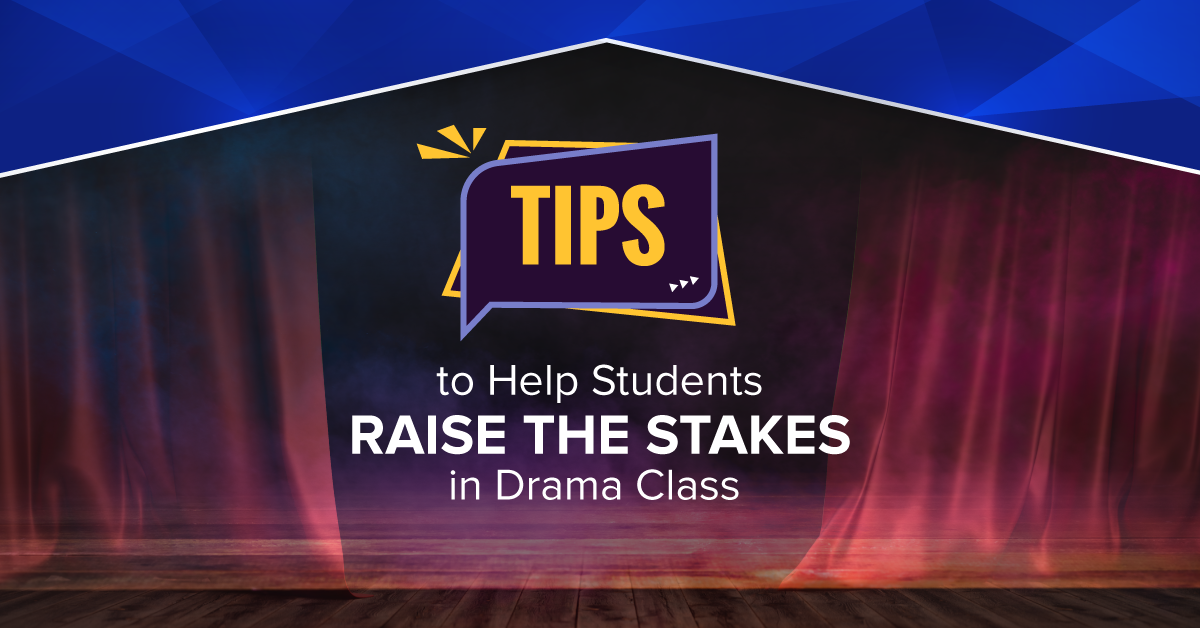Horror Movie 101: Failing Can Be Deadly by Steven Stack is a chilling mix of horror and humor - perfect for student performers and the spooky season! 👻
By
Kerry Hishon
Tips to Help Students Raise the Stakes in Drama Class
“Bigger! Louder! More, more, more!” We always want our drama students to push themselves to be larger than life onstage and in class. How can we help our students raise the stakes and bring more energy to their work? Here are some tips to try if your students are holding back, or not “going for it,” or their scenes seem bland, safe, or small.
- Many students don’t want to put themselves out there because they are worried about how their peers will view them. It may be helpful to do some trust building exercises to help your students feel more comfortable taking risks together. Try using Warm-Up Exercises for Trust Building, and employ the tips in Establishing Trust With Your Students.
- You Want Me To Do What Onstage? is another good resource that can help you and your students delve into what’s holding them back onstage.
- Dealing With Nerves has five suggestions for helping your students overcome their nervousness and give a bigger, bolder performance.
- Try baby steps. Work on gradually going bigger with your students. The rehearsal exercise Turn Up The Volume helps students to grow their vocal and emotional performances.
- Be silly together. Show your students that you’re willing to jump in and do the exercises with them. Elephant Walk is a fun way to be silly in class together, in a low-pressure way (no talking allowed).
- Add criteria that make everyone bigger. Have students do acting exercises or scene work where everyone has to stand or move in ballet second position (legs wide and arms open) or shout their lines.
- Have students work through exercises with raised stakes in the classroom. Try Worst Case Scenario, What’s The Worst That Could Happen?, and the “What If?” Game.
- Some students genuinely don’t know how to make their performances bigger. If your students are having a hard time understanding how to portray bigger emotions onstage, or their emotional performances are inconsistent, try using the tips in Physicalizing Emotions: How to Make Emotional Performances Consistent and Repeatable.
- Embrace the “and.” Have you heard the quote, “Feel the fear, and do it anyway”? Students can be nervous AND give a strong performance. Students can be worried about their scene work AND push through to do their best. Ask your students — when have they been nervous or scared and pushed through it? If you’re comfortable doing so, share a story about a time when you were nervous or anxious and how you overcame it.
- In a hurry? Here are three quick video tips for dealing with low energy onstage.
- How can you get your students to raise the stakes in playwriting?
- Challenge students to use better adjectives. For example, rather than a character being upset, angry, or happy, try using devastated, furious, or ecstatic.
- Try putting your character in a bigger situation. What would happen if your character were punished (or worse) for not achieving their goal? What if the reward for achieving their goal was even bigger than you had originally thought?
- Have students write reflections on the topic of raising the stakes, taking risks, and being bold and brave. You can find a selection of reflection questions in the download below.
Click here for a selection of reflection questions for your students.
Download For Free
Related Articles
Theatrefolk is the Drama Teacher Resource Company. We are your one stop shop for Plays, Resources, and Curriculum Support - all specifically designed for High School and Middle School drama teachers.
Copyright © 1995-2025



